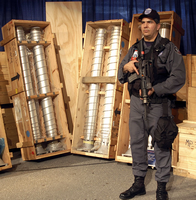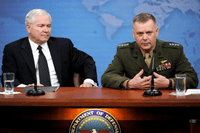Interesting bit of accounting by Geoffrey Forden at Arms Control Wonk, who does a “back of the napkin” calculation of how much the Natanz enrichment facility has actually cost Iran. Grand total? $270 million. There are broader costs associated with Iran’s nuclear program, but for now, the most troubling component at the heart of the diplomatic standoff remains the uranium enrichment going on at Natanz. For a facility that now dominates the region’s strategic agenda, that seems like a pretty good return on investment. It also means that whatever actual infrastructure damage, in dollar terms, that any airstrike might cause […]
Middle East & North Africa Archive
Free Newsletter
Six years and nearly four months ago, Washington’s neocon advocates of the war to oust Saddam Hussein predicted that a grateful Iraqi population would welcome victorious U.S. forces with flowers, music and dancing in the streets. It never happened. There was none of the emotional dizziness and tears of happiness that accompanied the liberation of Paris in 1944 — the romantic prototype for such events, and doubtless what the neo-cons had in mind. But those displays are taking place this week. There is music and dancing in the streets as Iraq launches a national celebration to mark its real liberation: […]
When it comes to the stakes involved in today’s Iraq “withdrawal,” so far discussion has focused on the implications for the U.S. project in Iraq. But the outcome, as reflected in the security situation over the next six months, will have regional repercussions as well, because we’re currently applying variations of the same nation-building model we’ve used in Iraq around the Middle East and South Asia. The most obvious example is Afghanistan, and there’s overlap with what we’re pressuring Pakistan to do in the FATA. But there’s also the U.S. involvement in training Palestinian security forces in the West Bank. […]
If you thought Tom Ricks was pessimistic about Iraq in the post-U.S. era, you haven’t read Jari Lindholm: . . .Whatever Iraq will look like after the war is over, it will not be ademocracy. In fact, I wouldn’t be surprised if next January’sparliamentary election would be the last of its kind for at least acouple of decades. As for the actual “withdrawal” of U.S. troops from cities, officially effective today, Lindholm calls it largely symbolic: This may be a big deal politically to both Obama and Maliki, but on theground little will change for the Americans. They have already […]

Cuba became the 54th national government to accede to the U.N.’s Nuclear Terrorism Convention on June 17, in a move meant to burnish the island nation’s counterterrorist credentials, which have been contested by the United States and other foreign governments. In depositing Havana’s instrument of accession to the International Convention for the Suppression of Acts of Nuclear Terrorism, as the convention is formally known, the Cuban mission to the U.N. issued a statement affirming the Cuban government’s “irrevocable commitment to the fight against terrorism under in all its forms and manifestations.” The Cuban government also exploited the occasion to contest […]
Looks like I wasn’t the only one to scratch my head about the eagerness to condemn what transpired in Honduras as an anti-democratic, extral-legal military coup. Jason Steck, writing at RCW’s The Compass, tries to clear things up: What both sides miss is that a “coup” isn’t always extralegal. In short, what is happening in Honduras may be an example of a coup that is not only legal, but mandatory. The oddness of this concept to American minds requires an explanation. [. . .] . . . [S]ome countries explicitly endow their military with a role inmaintaining democratic governance. . […]
When’s a comparison not a comparison? When you don’t intend it to be one. From Haaretz, on French President Nicolas Sarkozy’s recent meeting with Israeli Prime Minister Benjamin Netanyahu: Sarkozy then advised Netanyahu to fire [Foreign Minister Avigdor] Lieberman andbring former foreign minister Tzipi Livni back into the coalition,according to the report. Netanyahu reportedly told Sarkozy thatLieberman came across differently in private than his publicappearances would suggest. French far-right leader Jean-Marie Le Pen also comes across as anice person in private, Sarkozy reportedly responded, to whichNetanyahu replied that Lieberman was not Le Pen and that there was nobasis for comparison. […]
Worth noting that the Obama administration is not the only government facing tough choices about how to respond to the recent events in Iran. Germany, too, has experienced some divergences of opinion about whether a firm response on human rights should take priority over the need for a negotiated settlement to the nuclear standoff. As for the Russians, they’re deciding whether the events should get in the way of a signed-sealed-but-not-yet-delivered contract with Tehran for S-300 missile defense systems. Richard Weitz devoted one of his WPR columns to explaining the system’s significance. In a nutshell, it would make an airstrike […]
Depending on who you read, or who you believe, the post-election turmoil in Iran has either, 1) faded into a more repressive version of the status quo ante, with a more central role for the Revolutionary Guard and a resigned opposition that no longer credits the regime with any legitimacy; or 2) gone into hibernation mode, with a number of compromise (i.e., political) solutions still possible and/or the revolutionary fervor still roiling under the surface. It doesn’t take a genius to notice that the two are not mutually exclusive. Nor are the two clauses of the second option, for that […]

Four decades ago, when police and national guardsmen attacked protestors at the Democratic National Convention in Chicago, the protesters shouted, “The whole world is watching.” However arresting those images were, they could not possibly compare to the flood in recent weeks of YouTube videos, Flickr photos, Twitter tweets, Facebook pages, and blogs dedicated to events in Iran. Today, the world is not only watching — in an important way it is participating, as observers dig down for their own raw footage, reporting, and analysis pouring out of Iran. It is easy to be swept up by all of these images […]

Back before the Iraq surge, “military operations other than war” — a now-antiquated term referring to non-traditional warfare — were treated as “lesser includeds,” filed deep under subsections of big-war plans, doctrine, and acquisition strategies. Today, by contrast, the U.S. national security establishment is increasingly embracing what I like to call the “greater inclusive” paradigm, which recognizes our military’s rising quotient of such operations, not as some rare exception, but rather as the new rule. Thanks to Iraq and now Afghanistan-Pakistan, the military no longer assumes that any force constructed and trained for big wars can automatically handle the “other […]
In President Barack Obama’s restrained reaction to the upheaval in Iran, pragmatism won out. The administration’s calculation was that, in the long run, the United States was still going to have to do business with Iranian President Mahmoud Ahmadinejad. But Obama also avoided adding to what is widely perceived as America’s history of encouraging revolutions and then not supporting them. To mention two: References to the 1956 uprising in Hungary resurfaced this week because many Hungarians are still bitter that the West — and particularly the United States — failed to come to their aid in fighting Soviet troops. Radio […]

With events still unfolding inside Iran, it is not yet clear how things will pan out for the Islamic Republic, which now faces its greatest challenge since the regime’s early revolutionary days. But the reverberations of Iran’s internal tumult since the June 12 presidential elections are potentially far-reaching: Iran’s Arab neighbors, Israel, the European Union and, perhaps most importantly, the United States, are all observing developments closely to see how the crucial Middle East power’s internal ructions might impact their own strategic interests. The Obama administration initially chose to tread cautiously, not wanting to hand Iran’s hardliners a rhetorical weapon […]
So far, all the coverage I’ve seen of the U.S. and Venezuela normalizing diplomatic relations suggests that Caracas is far more impatient to get the process finalized than is Washington. This Latin American Herald Tribune article, citing a government-friendly Venezuelan daily is typical. But even this BBC article, which at first glance seems to suggest that both sides are on board, on closer inspection cites the Venezuelan foreign minister. That probably has to do with the fact that the Chavez-Ahmadinejad lovefest the past week makes for less-than-ideal political optics for President Barack Obama. But Chavez’s eagerness to formally restore ties […]

The political turmoil in Iran has brought new meaning to the maxim, “All politics is local.” In the age of disappearing distances, the fallout from rigged vote-counting in Tehran, Shiraz or Esfahan presents local challenges and opportunities to politicians in Fort Wayne, Beirut or Tel Aviv. Just as authorities in Tehran prove incapable of stopping the flow of information out of the country, the impact of Iran’s post-election crisis has also spilled across its borders, becoming an event with domestic repercussions around the globe. In the West, the crisis in Iran has created a platform on which politicians can stand […]
Joshua Foust highlights the disconnect between the public COINspeak surrounding Gen. Stanley McChrystal’s appointment to run the Afghanistan war and the private KILLspeak surrounding his appointment to run the Afghanistan war: [W]hile publicly McChrystal says everything rightabout being population-centric and all that, very few, and I mean thisseriously, VERY few of the groundpounders within USFOR-A are gettingexcited about finally executing a proper counterinsurgency. Instead,all the excitement is about “finally” being able to “take the fight tothe enemy,” “now we get to kick some ass,” and similar sentiments. In other words, at least a large number of soldiers, both within andwithout […]

ISTANBUL — Allegations that elements of the Turkish military may have been hatching a plot to discredit or even topple the government of the liberal Islamic Justice and Development Party (AKP) are threatening to raise military-civilian tensions in Turkey and further widen the country’s deep political divide. At the same time, the allegations are also raising questions about how the plot against the AKP fits into an ongoing investigation into another coup attempt, known as Ergenekon. This latest Turkish political crisis was sparked when Taraf — a hard-hitting liberal daily that has been severely critical of the military in the […]
